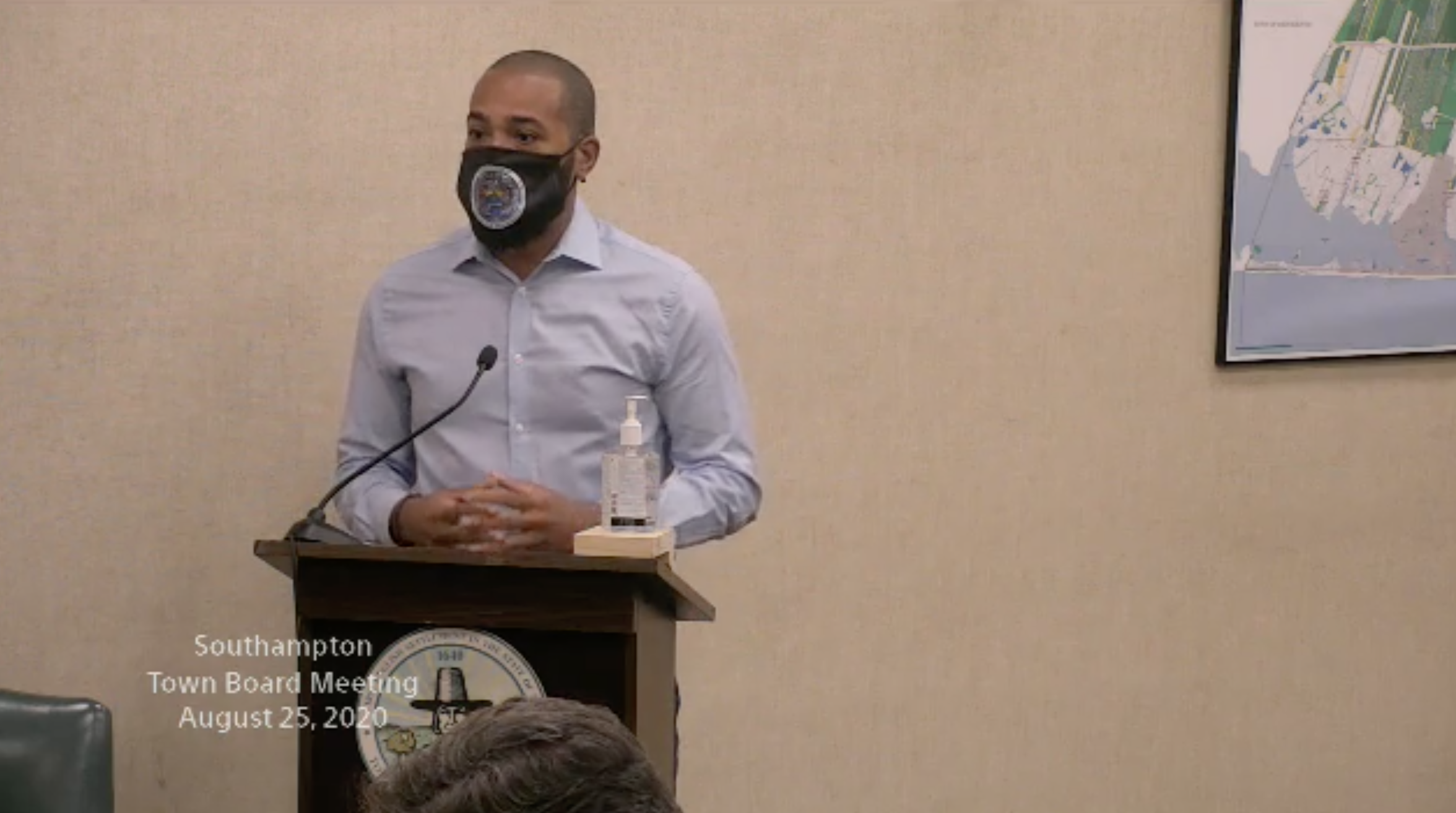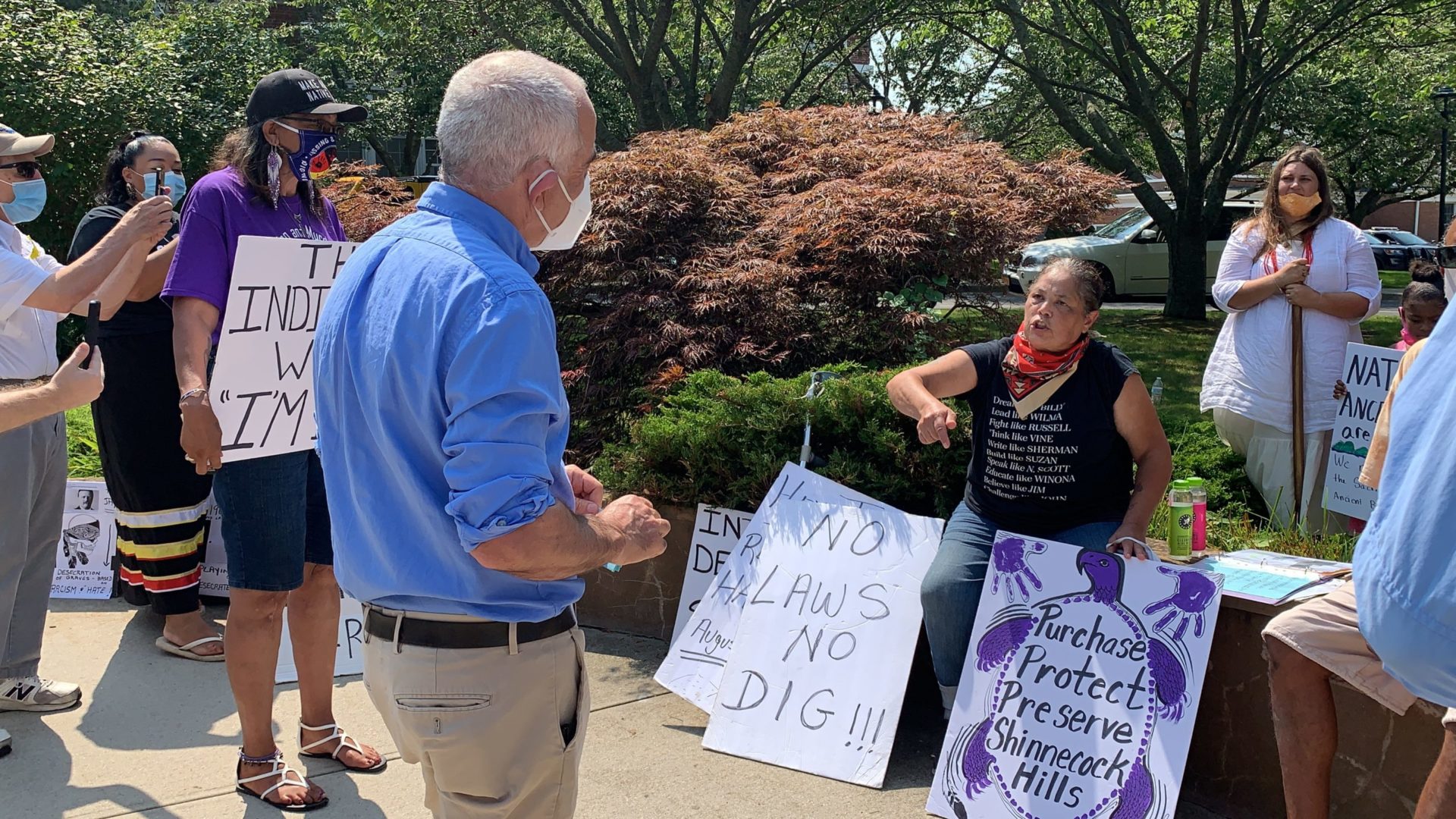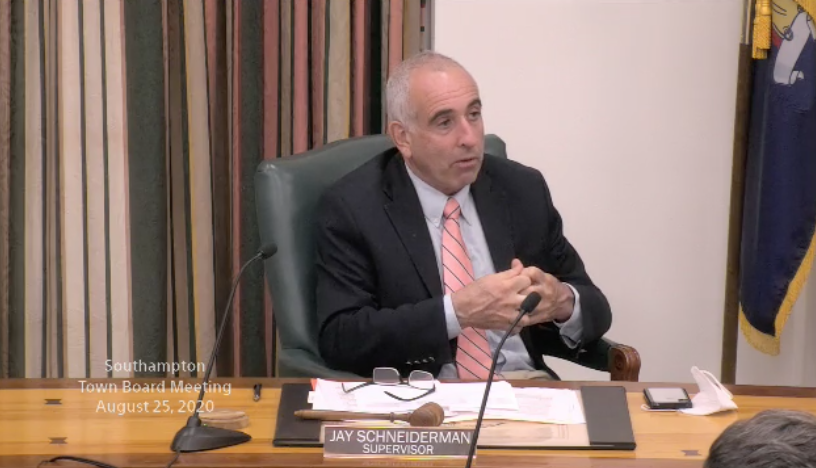'Fierce Urgency of Now' on Graves Protection Laws Embraced at Southampton Town Board Meeting


In an unexpected move following a protest in front of Southampton Town Hall on Tuesday, the Southampton Town Board decided that night to forge ahead with the process and close public hearings on three proposals that will help protect unmarked Shinnecock graves after five months.
“Every delay now is a potential desecration,” said Bryan Polite, the chairman of the Shinnecock tribal council, who attended Tuesday’s town board meeting. Six-month moratoriums in the Sugar Loaf and Fort Hill areas, as well as additional areas nearby where remains have been found, would mean property owners would have to go through certain archaeological review before certain projects.
Supervisor Jay Schneiderman had planned to ask for yet another adjournment, but, after hearing from several speakers during Tuesday night’s town board meeting, asked the other board members what they would think about closing the hearing to public comment and leaving the record open for one week for any additional written comments. The hearings have been open since March.
“We have been tabling this because we know a lot of people are interested in this and we’re concerned about inviting a lot of people,” due to the COVID-19 pandemic, the supervisor explained earlier in the evening. He announced a special meeting would be held via Zoom on the evening of September 15 to give all interested parties a chance to express their opinion.
Shinnecocks, particularly members of the Graves Protection Warrior Society, are frustrated by the delays. They held a small protest in front of Town Hall, which led to a confrontation with Schneiderman.
Polite said that their anger is not directed at any one board, but the system itself, which has continued to allow injustices decade after decade. They feel ignored, he said.
The Graves Protection Act, which outlines specific steps that must occur if human remains are found on any property in the town, is landmark legislation, he said. In fact, it would offer a protection that even the state does not have (laws have been proposed at the state legislature but it remains in committee). “With that being said, while we wait for this law to be enacted . . . construction continues, desecration continues,” he said. “It feels like every time we’re about to get to a point where we get something done and get the construction to stop, it gets pushed back. And then more construction happens, which is kind of like ripping a scab off a wound, a constant scab.”
“There is a saying by Dr. Martin Luther King Jr., ‘the fierce urgency of now,’ ” Polite said. “I implore this board to take this up and pass it. Every time another construction happens out there, it’s a wound, another wound. We have been listening to board, after board, after board, after board saying something is going to be done and we’re still here and there’s still construction going on . . . have the fierce urgency of now.”

Schneiderman said that he had reached out to Polite before the adjournments and he described it as “a mutual agreement between the leader of Southampton Town government and the leader of the Shinnecock.” Polite interjected, “It was an acknowledgement, correct,” that he said he relayed to the members.
“It’s not about the delays with the COVID, it’s more about the construction that goes on during the delays. That becomes the problem,” Polite continued.
He said he understood the pandemic has affected everything and pointed to the size of the Town Hall meeting room and that he would feel uncomfortable with tribal elders attending a meeting. “What we don’t understand is how construction continues to happen because of COVID,” he said. “While we wait, desecration continues to happen.”
“Understand, I don’t want the delay either,” the supervisor told him. “There is nothing I would have wanted more than this legislation to move very quickly.”
“We need to bring everyone together in the town to support our first peoples, because that will bring peace to everybody,” said Hope Sandro, who lives in the Fort Hill neighborhood. She said it seems that every time she leaves her driveway she sees a new for sale sign in her neighborhood. “There can’t be any more delays, please,” she added.
It has been disturbing to “see land area after land area developed knowing that in those lands are artifacts and the culture that has been buried, both literally and metaphorically. Metaphorically because of how the Nation members have been treated and literally because the grasses have been growing over these lands since 1858 when the town took them,” she told the board.

Kelly Dennis, a Shinnecock tribal member, said with the “mass exodus from the city” due to COVID-19, real estate sales have increased and building is booming. “This delay is giving them the opportunity to find ways to scramble and get their projects done,” in the Shinnecock Hills.
Ultimately, the board decided it was time to bring the hearings to a close so that the board can vote on them at their next regular meeting on September 8.
Schneiderman said he felt there had been ample time for comments, both oral and written. “We have heard quite a bit of testimony for and against this,” he said. No special Zoom meeting will be held September 15.
Councilman Rick Martel said that since joining the board in January, “almost everyday I’ve been here, we’ve discussed this” and that it had been one of the administration’s two top priorities before the pandemic. “I think the supervisor has done everything in his power. I apologize for the length of time it took. I think we’re 99% there.”
The hearing was closed, eliciting some clapping from the audience.
The delays were in the interest of public health, Schnedierman said. Later, he said, “I can’t speak for the decades and decades and decades where the Shinnecock people have been asking for this,” he said. “We’ve all acted in good faith, we just didn’t predict a pandemic. All we wanted to do was protect everybody the best we could.”



